Partner and Constuctive Opponent

A roundtable meeting on the subject “Tendencies of civil society development: German and Uzbek experience” was held in Tashkent.
The organizers of the event include the National Human Rights Center of the Republic of Uzbekistan, the Independent Institute for Monitoring the Formation of Civil Society (IIMFCS) and the representative office of the Friedrich Ebert Foundation in the Uzbekistan.
The roundtable was attended by members of the Legislative Chamber and the Senate of Uzbekistan, representatives of the executive and judicial power, civil society institutions, legal scientific public, educational establishments, mass media, as well as interntional organizations and diplomatic corps.
International experts and specialists were able to get acquainted at the event with large-scale work carried out in Uzbekistan on the development of civil society institutions, deeply analyze the national and foreign practices in this sphere, and specify concrete goals and objectives on the improvement of legislation and application of legal norms in the activities of NGOs.
The roundtable participants discussed the main tendencies in shaping civil society in Germany and Uzbekistan, organizational and legal foundations of public control, and interaction between bodies of state power and public organizations.
A strong civil society is a mandatory feature of a stable democratic state with a competitive economy, it was emphasized at the gathering. Civil society simultaneously serves as a partner of the government in the implementation of all its initiatives and its opponent, which defends the freedoms and interests of every citizen and different segments of the population. Development of modern civil institutions and encouragement of civil initiatives serves as an indicator of the country’s sustainable development and set up guarantees of Uzbekistan citizens’ political rights and freedoms.
The Concept of further deepening democratic forms and formation of civil society in Uzbekistan adopted by the Parliament in 2010 has turned into a strategic program of political and economic reforms in Uzbekistan, which marks a qualitatively new stage in the process of democratization and modernization of the country. About 40 laws and dozens of normative and legal acts have been adopted in compliance with this document, and a tangible contribution has been made to the development of civil society institutions.
Great importance is attached to the openness of government bodies’ activities under the current conditions of state advancement, which is one of the directions in the further process of shaping civil society in Uzbekistan. The Law “On the openness in the activities of government bodies of power and administration” adopted within the framework of the Concept realization in 2014 has defiined the basic principles in this sphere and the methods of its implementation.
A new mechanism of interaction between civil society and the government has been taking shape in recent years based on the equality of sides and partnership. The adoption of the Law “On social partnership” in 2014 ensured further expansion of the rights of non-governmental organizations and raised the level of government agencies’ responsibility before the society.
The forum participants noted that the state encourages the advancement of non-governmental organizations through conducting a policy of social partnership. Their role has significantly grown in rendering legal assistance to the population, raising the level of citizens’ political and legal awareness, in their work with the youth and women, in assisting with employment, and in supporting vulnerable groups. As of early 2016, the number of NGOs currently operating in Uzbekistan has reached 8,360.
It was particilarly emphasized that the normative and legal acts adopted in recent years have ensured significant simplification of registration procedure, organization of NGOs activities, and further improvement of organizational and legal foundations for the operation of citizens’ self-governing bodies.
International experts highly appreciated the processes of democratization in the Republic aimed at further development and improvement of parliamentary and public control, ensuring openness and transparency in the activities of government agencies. They will contribute to the formation of active and open civil society.
Concrete proposals were made in this direction.
“Every time I come to Uzbekistan, I get new information on the development of civil society in the Republic,” noted head of the Center of Corporate Citizenship of Germany, Suzanne Lang. “This provides an opportunity to compare the practices of our countries, find out something in common and single out some differences and specific features in understanding the role of civil society in the advacement and modernization of a country. Particular attention deserves the fact that Uzbekistan attaches important significance to strengthening the role of NGOs in the process of elaboration and implementation of socio-economic development of the country. Pooling experience between our countries on the issues of development of civil society has practical importance for bоth parties.”
“Consistent work is being carried out in Uzbekistan in the field of development of civil society institutions,” stressed regional coordinator of the Friedrich Ebert Foundation in Central Asia, Peer Teschendorf. “The ever-growing role of non-governmental organizations in the realization of public control over the activities of governrment agencies will consolidate the mechanisms of society’s efficient feedback with the governrment. The Foundation positevely assesses Uzbekistan’s efforts on the development of civil society in the country and is ready to provide its Uzbek partners further assistance in this process.”
“President Islam Karimov has set an urgent task of transition from a strong civil state to a strong civil society, and we follow this process with great interest,” said Ambassador of Germany in Uzbekistan, Neithart Höfer-Wissing. “A strong civil society may effciently impact the development of state and help in the solution of its internal and external functions; while a strong state may efficiently cooperate with its citizens and the society. I should note the high level of organization of this roundtable, which was held in the spirit of mutual understanding, as well as its practical significance.”



